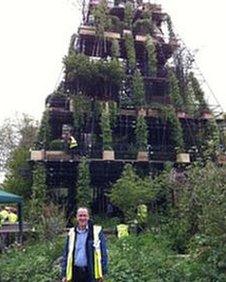The wisdom of plants
- Published
- comments

The Chelsea Flower Show opens today - the annual riot of colour and innovative garden design in south west London that's expected to attract over 150,000 visitors.
Highlights of this year's show include a seven-storey pyramid garden, and a visit from the Queen. But have you ever stopped to wonder what the plants make of it all?
In What a Plant Knows biologist Danny Chamovitz takes us on a fascinating journey of discovery through the science of the vegetative senses: the sights, smells, tastes and touches - even the memories - the flowers shrubs and trees all around us have evolved to sense and respond to their environment. It is a field guide to the secret world of plants.
"While animals can choose their environments," he says. "Plants must be able to withstand and adapt to constantly changing weather, encroaching neighbours, and invading pests, without being able to move. Because of this plants have evolved remarkably complex sensory and regulatory systems that allow them to modulate their growth in response to ever-changing conditions."
Gardeners - particularly the professionals exhibiting at Chelsea this week - have learnt how to exploit these abilities to their own ends, forcing plants in greenhouses and under lights to flower out of season or grow in specific ways
"Not all these plants should be growing here in England or flowering on 22 May," explains Prof Chamovitz. "So the exhibitors must have been manipulating the light environment and temperature in nurseries to make them think it's a different time of year. Plants know what they need to know."
If all that sounds like some sort of flaky, flower power appeal for vegetable rights, he says, it all comes down to what we mean by the word "know".
"Plants can't do trigonometry or algebra. This grass doesn't know its me, Danny Chamovitz, standing on it. But it does know something is standing here because it feels the pressure. If I rip a leaf the other leaves know it because they smell it. If we define knowing as being aware, then plants know quite a bit.
"I don't want to be too depressing and say we're not so special. What makes us special is that we're thinking about it and that we care. But we're not special because we have senses. All of nature has senses".
About the only thing plants can't do very well is hear. So if you're the kind of gardener who's prone to talking to your roses, or playing them music, the chances are that's doing more for you than it is for the plants.